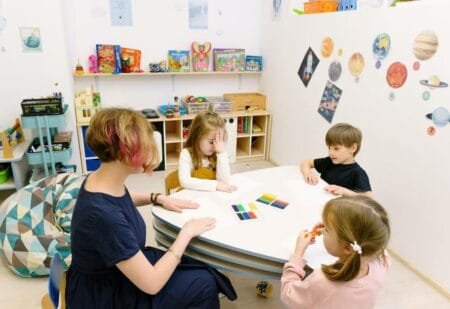Low digital skills and competences among school pupils and the need to integrate effective use of information and communication technologies into teacher training are among the most pressing challenges faced by European school education today, according to a report published by the European Commission and the New Media Consortium, a US-based not-for-profit body bringing together experts in education technology.
Advertisement
The first-ever Horizon Report Europe: 2014 Schools edition outlines the trends and technological developments that are likely to have an impact on education over the next five years. It grades the challenges faced by European schools in three categories: ‘Solvable’, ‘Difficult’ and ‘Wicked’.
The report echoes the objectives of the Commission’s Opening up Education initiative and is based on input from more than 50 experts from 22 European countries, the Commission’s Joint Research Centre, the Organisation for Economic Cooperation and Development (OECD) and the United Nations’ Educational, Scientific and Cultural Organisation (UNESCO). It says action is urgently needed to promote innovation in the classroom to take advantage of increased use of social media, open educational resources and the rise of data-driven learning and assessment.
The report outlines key trends, challenges and technological developments that are likely to have an impact on school education systems. The Horizon Report Europe: 2014 Schools Edition was produced by the European Commission in cooperation with a team led by Inholland University of Applied Sciences (the Netherlands) and the New Media Consortium (NMC), a US-based non-profit group bringing together international experts in educational technology.
How were the technologies, trends and challenges in the report selected?
The report covers 18 topics including new technologies like cloud computing, trends such as the growing use of social media, and challenges for schools such as the need to improve digital skills and competences. The themes were selected by the Horizon Project Europe Expert Panel, comprised of 53 specialists in European education, technology and other fields. The experts come from 22 European countries as well as international organisations and networks.
How will this report make a difference?
The report aims to help education policy makers, governing boards and school leaders to understand and develop strategies for increasing the use of technology to ensure Europe’s education systems equip pupils and students with the skills and competences they need in the future.
What information was used to compile the report?
The report includes references and links to more than 150 European publications (studies, articles, policy documents, blogs etc.), projects (both EU-funded and national) and policy initiatives in Europe and beyond. More than 70% of the examples cited in the report are European. The Creative Classrooms multidimensional framework, developed by the Joint Research Centre, was used to ensure a coherent, systematic and thorough review.
What are the trends identified in the report?
In the short term, the experts believe that social media will become ubiquitous in education. They also think that technology requires a rethink on the role of teachers. In the medium-term, teachers and learners will make increasing use of open educational resources and hybrid designs, which encourage combining physical and virtual learning environments. Finally, the experts believe that online learning will evolve significantly in the next five years, along with the rise of data-driven learning and assessment.
What challenges were identified in the report?
The experts looked at three different categories of challenges. Firstly, solvable challenges which can be easily addressed or where there are already solutions that can be easily implemented. These include integrating new technologies in teacher training and addressing low digital competence in schools. Secondly, difficult challenges, which will require more effort and time to address, such as ‘authentic learning’ (bringing real-life experiences into the classroom) and the blending of learning in physical and virtual environments.
Finally the experts classify some challenges as wicked. These challenges will be much more difficult and will take a longer time to solve. These challenges include the need to improve the teaching of complex thinking and effective communication, and to address the lack of strategies for ensuring that students take a more active role in co-designing their learning activities.
What technologies do the experts believe will be used in education in the next few years?
In the next year or so, cloud computing and tablet computing will be commonplace in many classrooms across Europe, while it will take 2-3 years before computer games become an integral part of teaching. Studies show that computer games can promote social skills and simulate scenarios which can help pupils better understand issues like racism or inequality. In addition, mobile devices such as smart phones and tablets will become increasingly useful tools for learning in the next few years. On the other hand, it will most likely take up to five years before personalised learning and virtual or remote laboratories are widely used.
What are open educational resources?
Open educational resources (OER) are learning resources such as text books, lecture notes, tests, assignments, film clips or audio files that can be used, shared and adapted to specific learning needs free of charge. They can be useful for teaching, learning, assessing as well as for research purposes. You can find European OER on OpenEducationEuropa.eu, the European Commission’s gateway to innovative learning.






